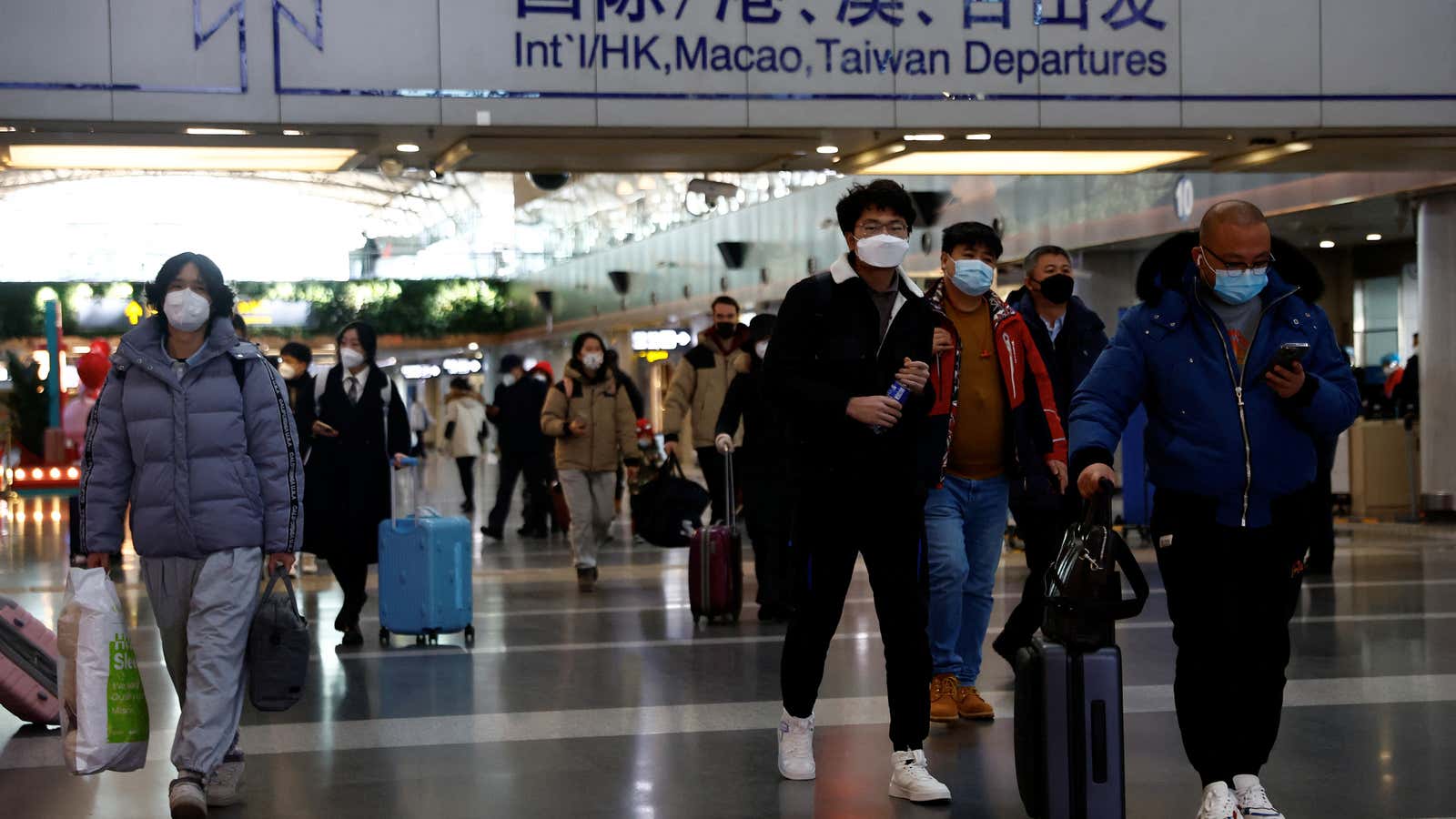Good morning, Quartz readers!
Here’s what you need to know
China will scrap quarantine rules for inbound travelers. The requirements will be lifted on Jan. 8, reopening the border after nearly three years.
Russia banned oil exports to countries imposing a price cap. The embargo, which will begin Feb. 1, is president Vladimir Putin’s response to the Western price cap that went into effect earlier this month.
Tesla is reducing its Shanghai production in January. The EV maker did not cite a reason for the planned slowdown, Reuters reports.
Several Japanese firms turned to the US and Oman for their energy needs. Companies including Inpex and Matsui signed long-term liquified natural gas deals, despite a broader push for energy security and green alternatives.
Spain announced a €10 billion ($10.65 billion) package to ease inflation costs. The country has spent a total of €45 billion ($47.88 billion) this year to help citizens cope with a cost-of-living crisis.
India is investigating the death of a Russian politician. Pavel Antov, a billionaire sausage mogul who criticized Russia’s invasion of Ukraine, reportedly fell out of a hotel window in India’s eastern state of Odisha on Dec. 24.
What to watch for
Luiz Inácio Lula de Silva’s narrow victory over incumbent Jair Bolsonaro in Brazil’s recent presidential election has reinvigorated the Latin American left. After victories in the five largest economies in Latin America, newly elected leaders across the region have vowed to prioritize environmental issues, blaming neoliberal policies for fueling the climate crisis.
The governments of Brazil, Venezuela, and Colombia have vowed to slow deforestation in the Amazon, with Lula promising that Brazil can remain a major agricultural producer without clearing another acre of rainforest. In the Andes region, Chile and Peru’s left-wing leaders have exerted pressure on foreign mining companies, threatening tax increases and strict environmental regulations.
And in Mexico, president Andres Manuel Lopez Obrador has geared up for a possible trade war with the US and Canada after proposing a ban on all genetically modified crops, deeming them detrimental to traditional agricultural practices and possibly hazardous to human health.
Southwest Airlines is freezing up
A deadly winter storm grounded thousands of flights across North America over Christmas and into this week. A big number of the canceled flights—including more than 70% of all US flights canceled on Dec. 26—were operated by US airline Southwest. The numbers are now drawing government scrutiny, and could land the carrier in some trouble.
The US Department of Transportation announced it would investigate the “unacceptable rate” of grounded Southwest flights. The airline in a statement blamed “consecutive days of extreme winter weather” for its unreliable service.
Operational issues are nothing new for Southwest. Unlike many other US airlines, which concentrate their service around a few big airport hubs, Southwest has a diffuse network of staff and aircrafts, potentially making it more vulnerable to a system-wide collapse in the midst of an extreme national weather event.
Demand is soaring for China’s funeral services stocks
Since Beijing ended its zero-covid policy earlier this month, about 250 million people have been infected, according to government figures. And shares of Fu Shou Yuan, China’s largest provider of funeral and burial services, are soaring, with the stock now up 80% from its low on Oct. 31.
China is suspending its daily reporting on covid casualties, but the death rate for covid is estimated to be somewhere around 5,000 deaths per 1 million infections. While China’s true death toll is hard to pin down, the stock market has become another macabre measure of the country’s covid crisis.
✦ Like stories like these that bring a new angle to the top headlines? Become a Quartz member today and help support our reporting. Sign up today, and take 50% off, on us.
Quartz’s most popular
🏠 US housing in 2023 won’t be a buyer’s market or a seller’s market
🇿🇼 Zimbabwe has banned the export of raw lithium
🤔 Why it’s so hard to convert offices into housing
💡 Who should be Twitter’s next CEO? Your best (and worst) ideas
☁️ How Amazon’s AWS hires for and develops hard-to-find cloud skills
💵 Why stablecoins maintain their dollar peg despite a run risk
Surprising discoveries
Glass frogs use their gizzards to turn transparent. Red blood cells concentrate in their livers when they want to stay undercover.
Physicists made a microscopic holiday record. At 40 micrometers wide, it’s still big enough to contain the first 25 seconds of “Rocking Around the Christmas Tree.”
A sneeze inspired a type of Catalonian pastry. Legend has it that “xuixo” (pronounced “shoo-shoo”) also has a romantic backstory.
Humpback whales may use bubbles as tools. They’ve been known to create “bubble nets” to entrap schools of fish while feeding.
Acidic air could help combat airborne viruses. The pH of indoor aerosols may impact how long they remain infectious.
Our best wishes for a productive day. Send any news, comments, microscopic record players, and gesundheit pastries to hi@qz.com. Reader support makes Quartz available to all—become a member. Today’s Daily Brief was brought to you by Heather Landy, Tim McDonnell, Annalisa Merelli, Diego Lasarte, and Julia Malleck.
